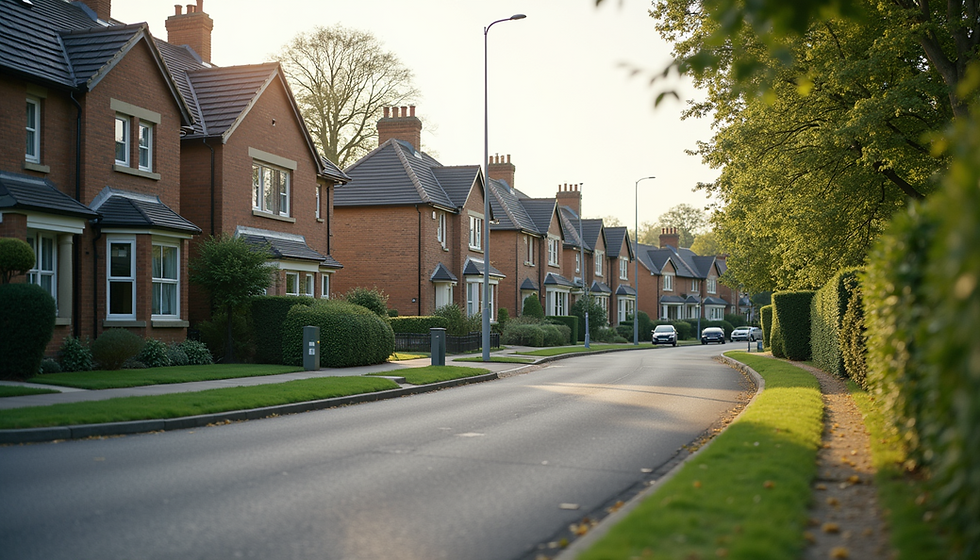Autumn budget 2021 and what does it mean for property industry.
- Lubomir Trizuliak, MA, MBA
- Oct 31, 2021
- 3 min read
THE BUDGET was announced earlier this week by Chancellor Rishi Sunak who revealed plans for ‘a brighter economic future' for the UK. With Britain's property market continuing to fly, how will the Government's financial plans affect housing across the nation?
The UK’s property market has shown no signs of slowing down post-Stamp Duty holiday, with demand continuing to outweigh the supply of homes for sale. Despite a boom in the market, unaffordable housing and homelessness remain a prominent issue across the nation. With billions of pounds worth of funding pledged to the housing sector, how will the Autumn Budget affect the property market?
With everything from affordable housing and cladding, to brownfield developments covered in the latest Budget, there was a lot to digest for those concerned with the UK’s property ladder.
Earlier today in Parliament, Rishi Sunak announced the following four ways the Budget will affect housing:
Extended Capital Gains Tax deadline from 30 days to 60 days
£24billion for new housing, including £11.5billion for up to 180,000 affordable homes built on brownfield sites
Four percent cladding tax will be placed on property developers with profits over £25million to help create a £5billion fund to remove unsafe cladding
£640million a year to address rough sleeping and homelessness
Property development When it comes to building houses it seems there is room in the Budget to take steps towards safer homes across the UK.
Cladding tax will be paid by residential property developers with profits in excess of £25million. The four percent tax will collectively raise enough money, approximately £5 billion, to remove unsafe cladding on existing properties.
This will give leaseholders greater peace of mind that their homes are safe - but the Royal Institution of Chartered Surveyors (RICS) says it is simply not enough.
Jonathan Hale, head of Government affairs at RICS told Housing Digital: “It’s still well short of the £15billion needed that is estimated to fix every building.”
Affordable housing
Solving the affordable housing crisis was at the forefront of the Autumn Budget with £24billion pledged for new housing.
Government plans to use brownfield sites for these new properties have been well-received by the industry with regards to the environmental impact.
Concerns over construction of the 180,000 homes have been raised in light of the construction crisis and lack of workers, though contractors across the country believe this could be a perfect opportunity for the Government.
Steve Collins, CEO of affordable housing provider Rentplus, said: "Any new investment in housing is to be welcomed but the current funding is still well short of what is needed to provide the affordable housing required to meet demand. Government's target is 300.000 homes per year.
How will the Budget affect property sales? With the Stamp Duty holiday having come and gone, an increase to Capital Gains Tax was forecast ahead of today's Budget announcement.
CGT is paid if you make a profit when you sell property that’s not your home, including buy-to-let properties, business premises, land or inherited property.
While CGT escaped a predicted increase, the biggest change was an increase from a 30 day payment period to 60 days.
The extension credited a recommendation made by the Office of Tax Simplification in May this year, which warned many taxpayers only find out about their obligations after they have sold their property.
Many home-buyers are thought to welcome the extended payment period after thousands of them received unanticipated fines.
While some of the Chancellor’s announcements were ‘welcome news’, companies in the housing industry have been quick to express their concerns over some areas which have been overlooked by the Government. Please read here some of the reaction from property industry.
Despite the enormous sum of money pledged to remove dangerous cladding from buildings across the UK, the National Housing Federation (NHF) added that the consequences of no direct funding to fix other building safety issues will be ‘far reaching.’
On their website, the NHF wrote: “Unfortunately, the consequences of no additional direct funding to fix building safety issues in social rented homes will be far reaching, leading to a loss of new affordable homes and less money for existing social homes.”




Часом знаходжу ці джерела випадково, іноді хтось скине в чат, іноді сам зберігаю “на потім”. Частину переглядаю рідко, частину — коли шукаю щось локальне чи нестандартне. Вони різні: новини, огляди, думки, регіональні стрічки. Я не беру все за правду — скоріше, для порівняння та пошуку контрасту між подачею. Можливо, хтось іще знайде серед них щось цікаве або принаймні нове. Головне — мати з чого обирати. Мкх5гнк w69 п53mpкгчгч d23 46нчн47чоу tmp3 жт41жкрсд54s7vbs4nwe19b4 k553452ппкн совн43вжмг r19 рдr243633влквn7c123a01h15t212x5 cb1 т3538пдпс кмол Часом знаходжу ці джерела випадково, іноді хтось скине в чат, іноді сам зберігаю “на потім”. Частину переглядаю рідко, частину — коли шукаю щось локальне чи нестандартне. Вони різні: новини, огляди, думки, регіональні стрічки. Я не беру все за правду —…
Мкх5гнк w69 п53mpкгчгч d23 46нчн47чоу tmp3 жт41жкрсд54s7vbs4nwe19b4 k553452ппкн совн43вжмг r19 рдr243633влквn7c123a01h15t212x5 cb1 т3538пдпс кмол Часом знаходжу ці джерела випадково, іноді хтось скине в чат, іноді сам зберігаю “на потім”. Частину переглядаю рідко, частину — коли шукаю щось локальне чи нестандартне. Вони різні: новини, огляди, думки, регіональні стрічки. Я не беру все за правду — скоріше, для порівняння та пошуку контрасту між подачею. Можливо, хтось іще знайде серед них щось цікаве або принаймні нове. Головне — мати з чого обирати.